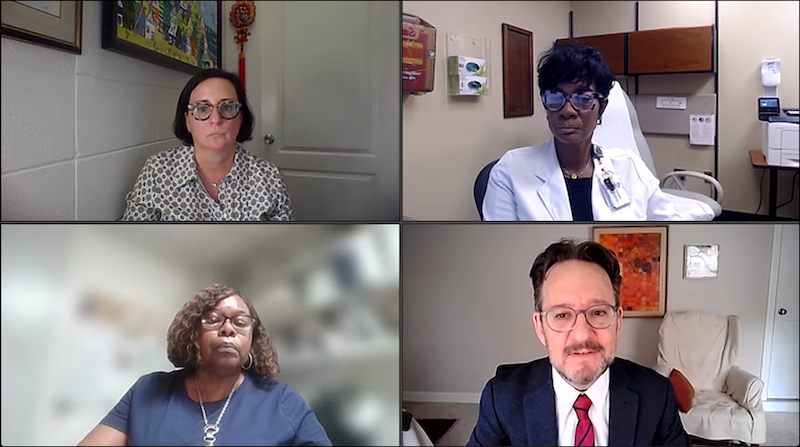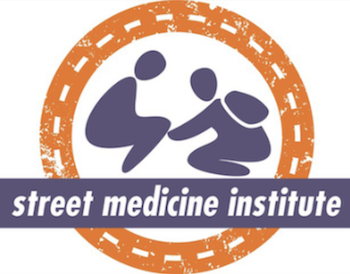Written by Brian C. Moon - May 30, 2024
 At a recent CEI Perspectives event hosted by the Center for Clinical and Translational Science (CCTS) and the Center for the Study of Community Health, healthcare professionals, community workers, and policy advocates gathered to address the critical issues surrounding healthcare equity for unhoused individuals. The event, titled Healthcare Equity for People Who are Unhoused, provided a comprehensive forum to discuss the unique challenges and innovative solutions needed to improve health outcomes and access to services for this vulnerable population. The discussion was moderated by Ann Elizabeth Montgomery, PhD, Associate Professor, UAB School of Public Health, Birmingham VA Health Care System, and panelists included Stefan Kertesz, MD, MSc, Professor of Medicine, UAB Preventive Medicine, Birmingham VA Medical Center; Monnaka Speights, RN, MSN, AG-CRNP, from Birmingham Veterans Health Care System; and Amy G. Sparks from Alabama Regional Medical Services. Read below for some of the key points from this insightful discussion.
At a recent CEI Perspectives event hosted by the Center for Clinical and Translational Science (CCTS) and the Center for the Study of Community Health, healthcare professionals, community workers, and policy advocates gathered to address the critical issues surrounding healthcare equity for unhoused individuals. The event, titled Healthcare Equity for People Who are Unhoused, provided a comprehensive forum to discuss the unique challenges and innovative solutions needed to improve health outcomes and access to services for this vulnerable population. The discussion was moderated by Ann Elizabeth Montgomery, PhD, Associate Professor, UAB School of Public Health, Birmingham VA Health Care System, and panelists included Stefan Kertesz, MD, MSc, Professor of Medicine, UAB Preventive Medicine, Birmingham VA Medical Center; Monnaka Speights, RN, MSN, AG-CRNP, from Birmingham Veterans Health Care System; and Amy G. Sparks from Alabama Regional Medical Services. Read below for some of the key points from this insightful discussion.Tailored Healthcare Services
Participants emphasized the importance of healthcare services that are specifically tailored to meet the needs of unhoused individuals. This includes integrating facilities for basic hygiene and providing access to food and clothing within healthcare settings. Such tailored services not only help in treating immediate medical needs but also in building trust and encouraging continual healthcare engagement among unhoused populations.
Impact of Substance Use and Mental Health
The discussions highlighted the intertwined issues of substance use, mental health, and homelessness. Advocates argued for integrated services that address these complex needs alongside housing, pointing out that managing substance use and mental health is crucial for the stability required to maintain housing and engage with medical care effectively.
Housing as a Health Determinant
 Moderator and panelists discuss healthcare solutions for unhoused individuals at the CEI Perspectives event.A major theme was the recognition of safe, affordable housing as a fundamental determinant of health. Various housing models, including temporary tiny houses and the Housing First approach, were discussed. Housing First provides housing without preconditions like sobriety, along with supportive services to ensure stability, highlighting the need for secure housing to improve health outcomes.
Moderator and panelists discuss healthcare solutions for unhoused individuals at the CEI Perspectives event.A major theme was the recognition of safe, affordable housing as a fundamental determinant of health. Various housing models, including temporary tiny houses and the Housing First approach, were discussed. Housing First provides housing without preconditions like sobriety, along with supportive services to ensure stability, highlighting the need for secure housing to improve health outcomes.Access Barriers
Participants identified multiple barriers to accessing necessary services, including bureaucratic challenges in obtaining housing vouchers, difficulties in securing identification, and the physical dispersal of services. There was a strong call for streamlined processes and better inter-agency coordination to facilitate easier access to these critical resources.
Rural vs. Urban Resources
The event also shed light on the distinct challenges faced in rural versus urban settings, with rural areas often lacking the basic services available in more densely populated urban centers. Innovative outreach strategies and community involvement were emphasized as solutions to bridge these gaps.
Legal Frameworks and Community Action
The legal rights of unhoused individuals and the impact of local ordinances on homelessness were significant topics. Upcoming Supreme Court rulings were discussed as pivotal moments that could shape future responses to homelessness. The conversation underscored the importance of community involvement and political advocacy in influencing policy and securing support for housing and healthcare initiatives.
Call to Action
 This CEI Perspectives event concluded with a strong call to action for all stakeholders to enhance efforts in providing integrated services that address both the immediate and long-term needs of unhoused populations. One recommended service was Street Medicine, which provides medical care directly to unsheltered people at locations like encampments, parks, and under bridges. The discussion highlighted the need for collaboration, innovative solutions, and persistent advocacy to ensure health equity for one of society's most vulnerable groups.
This CEI Perspectives event concluded with a strong call to action for all stakeholders to enhance efforts in providing integrated services that address both the immediate and long-term needs of unhoused populations. One recommended service was Street Medicine, which provides medical care directly to unsheltered people at locations like encampments, parks, and under bridges. The discussion highlighted the need for collaboration, innovative solutions, and persistent advocacy to ensure health equity for one of society's most vulnerable groups.Attendees left the event with a reinforced commitment to drive change and improve the conditions of unhoused individuals through practical solutions and community-focused actions. The event underscored the vital role of continued dialogue and partnership among different sectors to address the complex challenges of homelessness effectively. Clifford Kennon, EdS, MPA, CCTS Engagement of Communities Program Director commented, “This was a much-needed conversation about the unhoused population and their healthcare. Bringing together healthcare providers and community partners for this discussion provided education for those in attendance as well as valuable resources and action items. Advocacy for medical respite care for people who are homeless or unhoused along with additional community outreach to our elected officials is strongly needed to amplify the needs of this vulnerable population.” For those who missed the live discussion or wish to revisit the insightful contributions and resources, a full recording is available on the CCTS Video Channel. To stay informed of all upcoming CCTS events, subscribe to the weekly CCTS Digest. If you attended this event, we would appreciate a few minutes of your time to complete our event evaluation.
